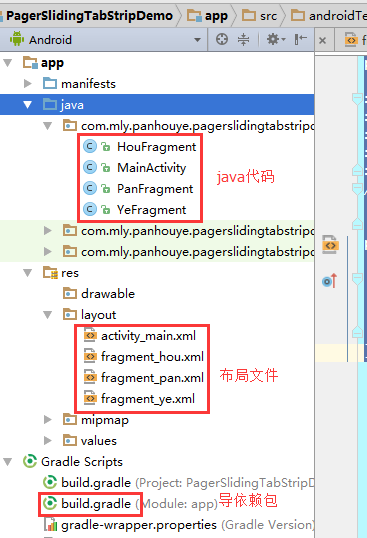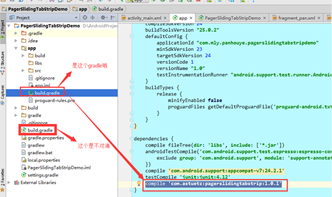Android中使用PagerSlidingTabStrip实现导航标题的示例
此开源框架官网地址:https://github.com/astuetz/PagerSlidingTabStrip
可以理解为配合ViewPager使用的交互式页面指示器控件。
话不多说,先上效果图:

为了演示其中的pstsIndicatorHeight与pstsUnderlineHeight 的区别,进行了不同的设置已区分效果(做了去除actionbar处理)。大家可以很直观的看出相比之前单独使用ViewPager以及ViewPager与Fragement嵌套,本次演示PagerSlidingTabStrip的使用,为页面导航提供了相对更加绚丽的切换效果,下面我们就介绍下PagerSlidingTabStrip的使用。
前期相关博文推荐:
Android中Fragment和ViewPager那点事儿
Android中使用ViewPager实现屏幕页面切换和页面轮播效果
一、基本属性介绍
- apstsIndicatorColor //Color of the sliding indicator 滑动条的颜色
- pstsUnderlineColor //Color of the full-width line onthe bottom of the view 滑动条所在的那个全宽线的颜色
- pstsDividerColor //Color of the dividers betweentabs 每个标签的分割线的颜色
- pstsIndicatorHeight //Height of the sliding indicator 滑动条的高度
- pstsUnderlineHeight //Height of the full-width line onthe bottom of the view 滑动条所在的那个全宽线的高度
- pstsDividerPadding //Top and bottom padding of thedividers 分割线底部和顶部的填充宽度
- pstsTabPaddingLeftRight //Left and right padding of eachtab 每个标签左右填充宽度
- pstsScrollOffset //Scroll offset of the selectedtab
- pstsTabBackground //Background drawable of each tab,should be a StateListDrawable 每个标签的背景,应该是一个StateListDrawable
- pstsShouldExpand //If set to true, each tab isgiven the same weight, default false 如果设置为true,每个标签是相同的控件,均匀平分整个屏幕,默认是false
- pstsTextAllCaps //If true, all tab titles will beupper case, default true 如果为true,所有标签都是大写字母,默认为true
所有的属性都有他们自己的getter和setter方法来随时改变他们

二、本次演示的代码结构

三、设置去除ActionBar
在res/values/styles.xml中设置
<style name="AppTheme" parent="Theme.AppCompat.Light.NoActionBar">
整体xml文件如下:
<resources>
<!-- Base application theme. -->
<style name="AppTheme" parent="Theme.AppCompat.Light.NoActionBar">
<!-- Customize your theme here. -->
<item name="colorPrimary">@color/colorPrimary</item>
<item name="colorPrimaryDark">@color/colorPrimaryDark</item>
<item name="colorAccent">@color/colorAccent</item>
</style>
</resources>
四、导依赖包
使用AndroidStudio2.2。仍然采用在build.gradle下中dependencies下直接添加如下代码:
compile 'com.astuetz:pagerslidingtabstrip:1.0.1'

五、layout布局文件
布局前对颜色做了一些引用设置,res/values/colors.xml文件如下:
<?xml version="1.0" encoding="utf-8"?> <resources> <color name="colorPrimary">#3F51B5</color> <color name="colorPrimaryDark">#303F9F</color> <color name="colorAccent">#FF4081</color> <color name="color_theme">#489cfa</color> <color name="transparent">#00000000</color> <color name="yellow">#fc9630</color> </resources>
(1)主布局文件activity_main.xml
PagerSlidingTabStrip配合ViewPager一起使用,本次将ViewPager放置在PagerSlidingTabStrip下面,具体布局文件如下(大家根据前文中的属性解释来对照不理解的属性,注意添加app命名空间):
<?xml version="1.0" encoding="utf-8"?>
<RelativeLayout xmlns:android="http://schemas.android.com/apk/res/android"
xmlns:tools="http://schemas.android.com/tools"
xmlns:app="http://schemas.android.com/apk/res-auto"
android:id="@+id/activity_main"
android:layout_width="match_parent"
android:layout_height="match_parent"
tools:context="com.mly.panhouye.pagerslidingtabstripdemo.MainActivity">
<com.astuetz.PagerSlidingTabStrip
android:id="@+id/pst"
android:layout_width="match_parent"
android:layout_height="48dip"
android:background="@color/color_theme"
app:pstsShouldExpand="true"
app:pstsTabBackground="@color/transparent"
app:pstsIndicatorHeight="5dp"
app:pstsIndicatorColor="@color/yellow"
app:pstsTextAllCaps="false"
app:pstsUnderlineHeight="15dp"
/>
<android.support.v4.view.ViewPager
android:id="@+id/pager"
android:layout_width="match_parent"
android:layout_height="match_parent"
android:layout_below="@+id/pst"/>
</RelativeLayout>
(2)对应的Fragment布局文件
本次仅演示简单效果,fragment_pan, fragment_hou, fragment_ye每个布局文件仅仅文字不同,这里仅演示其中一个fragment_pan.xml:
<?xml version="1.0" encoding="utf-8"?>
<LinearLayout xmlns:android="http://schemas.android.com/apk/res/android"
android:orientation="vertical" android:layout_width="match_parent"
android:layout_height="match_parent">
<TextView
android:layout_width="match_parent"
android:layout_height="match_parent"
android:gravity="center"
android:text="潘"
android:textSize="100sp"
/>
</LinearLayout>
(3)每个fragment要用来填充对应的fragment类,演示ragment_pan.xml布局对应的fragmen类HouFragment.java:
package com.mly.panhouye.pagerslidingtabstripdemo;
import android.os.Bundle;
import android.support.v4.app.Fragment;
import android.view.LayoutInflater;
import android.view.View;
import android.view.ViewGroup;
/**
* Created by panchengjia on 2017/1/15 0015.
*/
public class HouFragment extends Fragment {
@Override
public View onCreateView(LayoutInflater inflater, ViewGroup container, Bundle savedInstanceState) {
View view =inflater.inflate(R.layout.fragment_hou,null);
return view;
}
}
六、Java实现代码
package com.mly.panhouye.pagerslidingtabstripdemo;
import android.os.Bundle;
import android.support.v4.app.Fragment;
import android.support.v4.app.FragmentManager;
import android.support.v4.app.FragmentPagerAdapter;
import android.support.v4.view.ViewPager;
import android.support.v7.app.AppCompatActivity;
import com.astuetz.PagerSlidingTabStrip;
import java.util.ArrayList;
public class MainActivity extends AppCompatActivity {
PagerSlidingTabStrip pst;
ViewPager viewPager;
ArrayList<Fragment> fragments;
//声明pst的标题
String[] titles = {"潘","侯","爷"};
@Override
protected void onCreate(Bundle savedInstanceState) {
super.onCreate(savedInstanceState);
setContentView(R.layout.activity_main);
pst= (PagerSlidingTabStrip) findViewById(R.id.pst);
viewPager= (ViewPager) findViewById(R.id.pager);
fragments = new ArrayList<>();
HouFragment houFragment = new HouFragment();
PanFragment panFragment = new PanFragment();
YeFragment yeFragment = new YeFragment();
//添加fragment到集合中时注意顺序
fragments.add(panFragment);
fragments.add(houFragment);
fragments.add(yeFragment);
FragmentManager fragmentManager = getSupportFragmentManager();
viewPager.setAdapter(new MyPagerAdapter(fragmentManager,titles,fragments));
viewPager.setCurrentItem(0);
//当ViewPager的onPagerChangeListener回调时,PagerSlidingTabStrip也一起随之变动
//具体做法都已封装到了PagerSlidingTabStrip.setViewPager()方法里,使用时调用实例如下
pst.setViewPager(viewPager);
pst.setTextSize(30);
}
/**
* 自定义适配器
*/
class MyPagerAdapter extends FragmentPagerAdapter {
private String[] titles;
ArrayList<Fragment> fragments;
//根据需求定义构造方法,方便外部调用
public MyPagerAdapter(FragmentManager fm, String[] titles, ArrayList<Fragment> fragments) {
super(fm);
this.titles = titles;
this.fragments = fragments;
}
//设置每页的标题
@Override
public CharSequence getPageTitle(int position) {
return titles[position];
}
//设置每一页对应的fragment
@Override
public Fragment getItem(int position) {
return fragments.get(position);
}
//fragment的数量
@Override
public int getCount() {
return fragments.size();
}
}
}
本次仅仅演示的是PagerSlidingTabStrip最最基本的使用方法,大家可以尝试使用它搞出更加绚丽的切换效果,干吧。
以上就是本文的全部内容,希望对大家的学习有所帮助,也希望大家多多支持我们。

